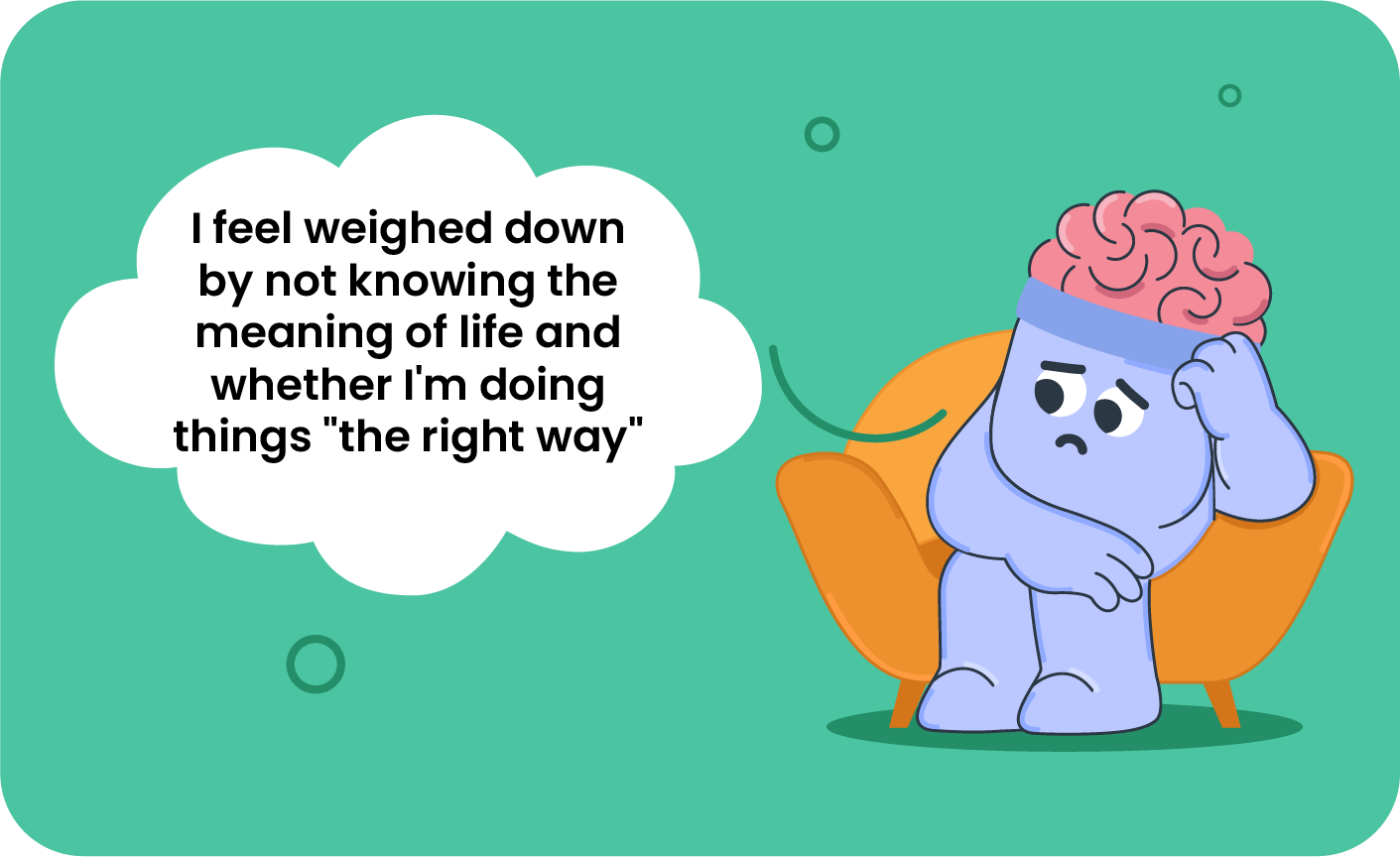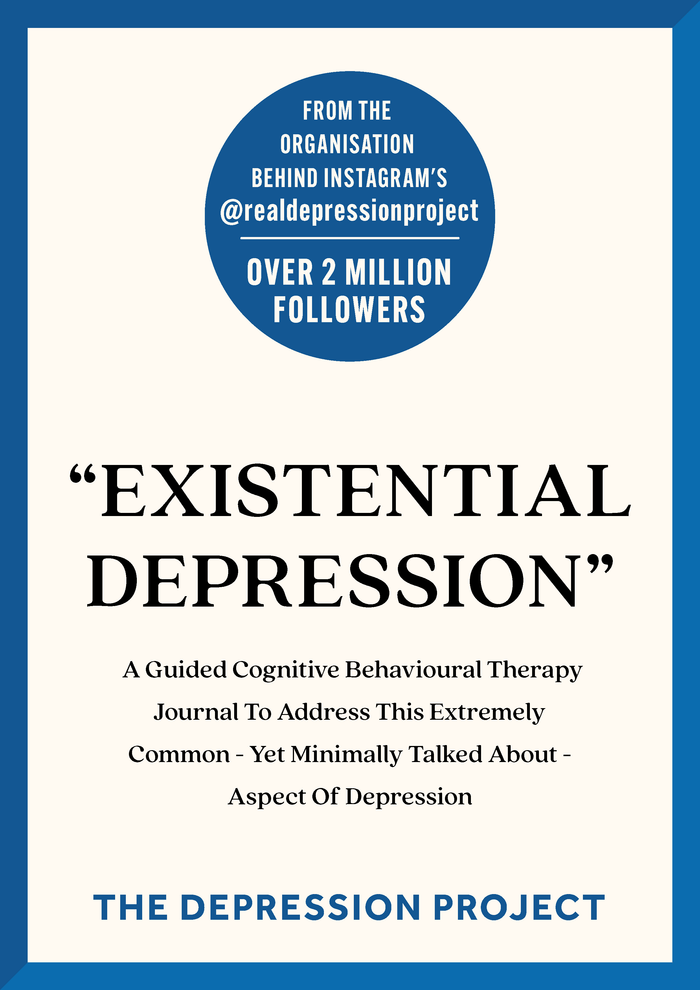As we've heard from countless people throughout the course of running The Depression Project, "existential depression" is a very, very common issue that many people with depression struggle with. And, if you can relate, right now, we'd like to share with you a free excerpt from our "Existential Depression" Journal in order to help you take a step closer towards overcoming this issue :)
Are You Currently Living Your Life In Alignment With Your Values (A Free Excerpt From Our "Existential Depression" Journal)
While “existential depression” can indeed have different underlying causes for different people, some extremely common such causes include:
- Feeling as if your life lacks meaning and purpose;
- Uncertainty over whether you’re living in the “right way”;
- Feeling unfulfilled, and therefore questioning “surely there’s more to life than this?”
And, if you can relate, then it can really help to get in touch with your own personal values, and to re-focus your life around them.
What Do We Mean By “Values”?
In the context we’re talking about them, there is no one single definition of what values are. However, some helpful descriptions, explanations and/or examples include:
- Values are your heart’s deepest desires … for what you want your life to be about … for what you want your life to stand for … for the kind of person you want to be … for how you want to treat yourself and other people … for how you want to act and the qualities you want to develop.1
- Your values are what you consider to be deeply important and meaningful to you.2
- Because your values are what you consider to be deeply important and meaningful to you, personally, they may or may not align with, for example, your friends’ values, your family’s values, “society’s values”, and/or the values you were raised to live by.
- While different people have different values, some common examples of values include love, kindness, generosity, compassion, honesty, authenticity, accountability, learning, self-development, achievement, freedom, family, adventure, excitement, safety, curiosity, loyalty, creativity, open-mindedness, courage, bravery, contribution, happiness, dependability, integrity, adaptability, self-reliance, perseverance, resilience, health, community, modesty, frugality, sharing, patience, patriotism, independence, security, and helping others.
- You may – and almost certainly will – have different values when it comes to different aspects of your life. For example:
- When it comes to your relationships, you may value, for example, kindness, honesty, loyalty and open-mindedness;
- When it comes to your work, you may value security and contribution;
- When it comes to your leisure time, you may value adventure, excitement and creativity;
- When it comes to your personal development, you may value learning and achievement.
- Values can also be attitudinal in nature3 – in the sense that they form the basis for the attitude you choose to adopt in a given situation. For example:
- You may value modesty and generosity during times of success and prosperity;
- You may value resilience and courage when times are hard;
- You may value dignity, being an inspiration to others, and not giving up in the midst of unavoidable suffering.
- It can be easy to mistake values for behaviours – such as, for example, behaviours like “studying hard” or “donating money to charity every year”. However, values are not behaviours like “studying hard” or “donating money to charity every year” – rather, values are found in the overarching purpose of your behaviours2 (which, for our examples, may include “self-development”, “self-reliance”, and “learning” when it comes to studying hard, and “helping others” and “contribution” when it comes to donating to charity). Similarly, values are also not goals which are either realised or not realised – such as getting a degree, buying a house or getting married, for example. Rather, as was the case with behaviours, values can be found in the overarching purpose of your goals. In these ways, your values serve as your own personal compass – because they give you direction and guide your life’s journey4.
- Values are also not feelings. After all, while you cannot always choose or control how you feel4, you can always choose whether or not to act in alignment with your values1.
How Can Living A Values-Orientated Life Help You Cope With And In Time Overcome “Existential Depression”?
As we hope you’re beginning to see, living your life in alignment with your own personal values can be a vital component of coping with and in time overcoming “existential depression”. In particular, this is because:
- According to members of The Depression Project’s community, lack of meaning, purpose and fulfillment are primary causes of “existential depression”. And, if you can relate, then living your life in alignment with your own personal values which you have deemed as deeply important and meaningful to you ensures that – by definition – your life will be meaningful, purposeful and fulfilling for you. Similarly, values-based living is also an antidote to the common existential thought “what’s the point in anything if we’re all going to die?” After all, even though life is finite, if it’s lived in alignment with your values, then it will still contain meaning, purpose and fulfilment for you.
- For the same underlying reasons, values-based living can also definitively answer – and therefore end speculation to – the existential thought “do I really want to keep living in this cruel, unfair world?” This is because when you’re living in alignment with your values and your life therefore contains meaning, purpose and fulfilment, the answer to this question will almost certainly be “yes” (for example, if this is an existential thought you think, then you likely value “justice” and “helping others”. And, if this is the case, then acting in alignment with these values – such as by protesting against injustices and volunteering to help victims of the world’s unfairness – will likely give your life the meaning, fulfillment and purpose you need in order to want to continue living it).
- Additionally, uncertainty over whether or not you’re “living the right way” was also cited by The Depression Project’s community members as another source of “existential depression”. However, while there is no universal “right way” to live, like we mentioned above, the values you choose to live by will give you direction and guide your life’s journey – and in this way, they illuminate the way to live that is right for you.
- Furthermore, if you’ve experienced some form of loss – such as through the death of a loved one, an important relationship ending, or the end of a dream that you poured your heart and soul into, for example – then you may find yourself experiencing existential thoughts such as “after what I’ve lost, there’s no point being alive anymore”. However, even in these devastating cases, living a life in alignment with your values – even if those values change as a result of the loss you’ve endured – can still give you meaning, purpose and fulfilment moving forwards. For example, if you lose a loved one, then:
- If you value helping other people, this could manifest in you supporting other people who have suffered a similar loss to you;
- If you value honouring your loved one’s memory and “living a life that they would be proud of”, then it may manifest in you going all out to chase your dreams that in the past, you may have been too scared to pursue.
- Moreover, as some of The Depression Project’s community members also mentioned, “existential depression” can also be fuelled by the thought “what if what I’m longing for never ends up happening? What will the point in anything be then?” However, like we have mentioned, values are not a goal that you long for which is either achieved or not achieved / realised or not realised. Rather, values can be found in the overarching purpose of your goal / what it is you are longing for. And, for this reason, even if what you are longing for does not end up happening, then as disappointing as this will undoubtedly be, it does not mean that your life will consequently be completely purposeless. After all, even in the face of this disappointment, you will still have the choice to, moving forwards, continue to act in alignment with your values. And, as long as you do this, your life will continue to have meaning, purpose and fulfilment.
- Additionally, focusing your attention on taking steps to live in alignment with your values can also divert attention away from unhelpful, intrusive existential thoughts – which is yet another way that values-based living can help you cope with and in time overcome “existential depression”.
End of free excerpt
We really hope you've found this free journal excerpt helpful, our friend.
All our love,
The Depression Project Team.
P.S. If you'd like to learn more strategies to help you cope with and overcome "existential depression", then click the link below to learn more about this cognitive behavioural therapy-based journal and to get your copy.


